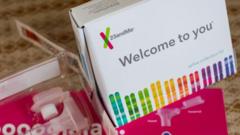In a significant turn of events, 23andMe, known for its genetic testing services, is seeking court-supervised sale processes while assuring customers that their data handling policies will remain unchanged.
23andMe Files for Bankruptcy Amid Leadership Changes

23andMe Files for Bankruptcy Amid Leadership Changes
Popular DNA testing company 23andMe has announced its bankruptcy protection filing and the immediate resignation of CEO Anne Wojcicki.
In the wake of financial turmoil, 23andMe has officially filed for bankruptcy, ushering in immediate leadership changes, including the resignation of co-founder and CEO Anne Wojcicki. The company indicated in a press release that it intends to pursue a sale under court scrutiny, continuing its operations during this period. Assurances were made regarding the safeguarding of customer data, despite the California Attorney General's recent consumer alert urging users to erase their accounts amid the company’s reported financial hardships.
Initially celebrated for its saliva-based DNA test kits and extensive customer data offerings, 23andMe once peaked at a valuation of approximately $6 billion (£4.6 billion). However, since its inception in 2006 and subsequent public listing in 2021, the company has struggled to achieve profitability. In September, it resolved a lawsuit pertaining to a significant data breach in 2023 that had exposed the personal information of nearly seven million customers, although DNA records were reportedly secure. Following the litigation, the company underwent substantial layoffs, reducing its workforce by 40% through the termination of 200 employees.
The financial struggles intensified with 23andMe appointing CFO Joe Selsavage to take on the role of interim CEO, while Wojcicki will remain on the board after her failed attempts to take the company private without a third-party buyout. The firm, once endorsed by celebrities such as Oprah Winfrey and Snoop Dogg, has faced challenges in reimagining its business model as many customers felt unsatisfied with the results of their DNA analysis. Efforts to introduce a subscription service faltered, and its ambitions in drug development utilizing its genetic data faced difficulties.
The company’s board chair, Mark Jensen, noted the commitment to protect customer data as a potential transaction consideration, yet concerns linger among users regarding the status of their shared DNA data. Observers point out that in the UK, such information is classified as specially protected, prompting legal considerations for customers if the company undergoes significant changes. Concerns about data ownership extend to the genetic information of relatives, raising ethical questions that consumers must navigate amid the company's uncertain future.
The fallout continues to be closely monitored as 23andMe attempts to recover from its current crisis and redefine its operational pathway.



















